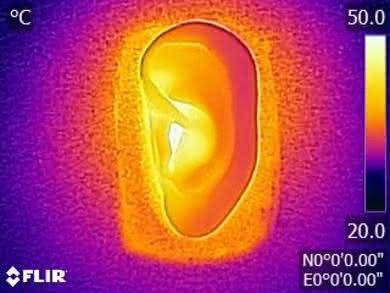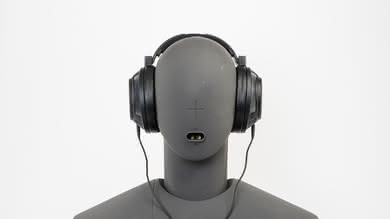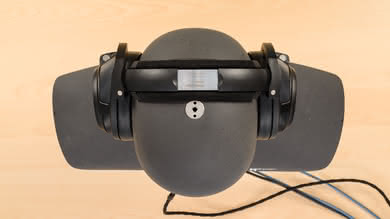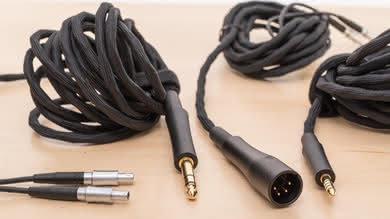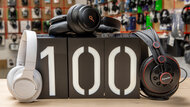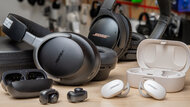The Sennheiser HD 820 are good critical listening headphones but do not quite surpass the HD 800 S. They have an excellent build quality and a comfortable over-ear fit that you can wear for hours. The closed-back ear cups also make them a bit more versatile than the HD 800 S, although not by much, since they are not designed for anything else but critical listening. Unfortunately, although they have a bit more bass on average, they do not sound as good as the HD800 S overall, which is a bit disappointing, especially considering their much higher price point.
Our Verdict
Mediocre-at-best for mixed usage. The Sennheiser HD 820 are a bit more versatile than the HD 800 S thanks to their closed-back design. They isolate a bit more in noisy environments, and they leak a little less. They also have an excellent build quality that feels high-end and durable and a decently well-balanced sound that makes them a good choice for audiophiles that prefer a bit more bass. Unfortunately, they do not sound quite as good as the HD 800 S which will be disappointing for some, especially due to the price difference. Also, they're still rather bulky critical listening-only headphones so they won't be versatile enough to take outdoors or for other more casual use cases since they are not designed for that. On the upside, they are a decent option to watch movies, thanks to their low latency and decently long audio cable.
-
Good audio reproduction.
-
Excellent build quality and design.
-
Comfortable.
-
Bass delivery varies significantly across users. Sensitive to glasses.
-
Disappointing value to sound quality ratio.
Good for neutral listening. These headphones are comfortable to wear for hours at a time and deliver a decently well-balanced sound and a bit more bass, on average, than the Sennheiser HD 800 S. Unfortunately, their bass is prone to a lot of inconsistencies across multiple listeners, and they do not sound quite as good overall. They have a large soundstage for a closed-back design, but it's nowhere near as spacious as the HD 800 S. Their mid-range is also a bit too forward. It pushes instruments to the front of the mix, but there's a dip in the lower mid-range that creates a hole in their audio reproduction. This makes it feel like something is always missing in the mid-range no matter what track you're listening to, which is a little disappointing, especially considering the price gap between the HD 820 and the HD 800 S. Some audiophiles will appreciate the deeper bass of the HD 820 and the relatively large soundstage for a closed-back design, but it may not be worth the investment for most.
Not suitable for commuting. The closed-back design of the ear cups blocks a bit more noise than the HD 800 S but they're not portable and do not have a control scheme for mobile devices. You also need a sufficiently powerful device to drive these headphones so your phone will not be enough.
Not meant for sports. They're heavy and require an amp so you won't be using them outside anytime soon.
Sub-par for office use. They block a bit more noise and do not leak as much as the HD 800 S so you can use them in more varied office environments. However, they still leak enough to be bothersome to the people around you in quieter conditions. They also do not block enough noise for very lively offices but on the upside, they're comfortable enough to wear for hours and they have no battery life since they are passive and wired.
Mediocre-at-best for gaming. The Sennheiser HD 820 are comfortable, sound good and have a low latency wired connection. However, they do not have a microphone for voice chat when gaming, and no customization options which are typical for most gaming headsets. Also, they do not have the convenience of wireless design or multiple connection options for an optimized experience on Xbox One or PS4.
- 6.0 Mixed Usage
- 7.3 Neutral Sound
- 6.0 Commute/Travel
- 5.5 Sports/Fitness
- 6.2 Office
- 4.6 Wireless Gaming
- 6.4 Wired Gaming
- 2.2 Phone Call
Changelog
- Updated Nov 21, 2019: Converted to Test Bench 1.3.1.
- Updated Nov 21, 2019: Converted to Test Bench 1.3.
- Updated Aug 29, 2018: Review published.
- Updated Aug 27, 2018: Our testers have started testing this product.
- Updated Aug 25, 2018: The product has arrived in our lab, and our testers will start evaluating it soon.
Check Price
Popular Headphones Comparisons

The Sennheiser HD 820 are good critical listening headphones with an excellent and premium build quality. They feel exceedingly well-made, with great-looking closed-back earcups that make them a bit more isolating than the HD 800 S, so you can listen to them in more environments without distracting the people around you with leakage. They have a good sound that, on average, packs a bit more bass than the similarly designed but open-back HD 800 S. Unfortunately, their sound quality is slightly disappointing when compared to the HD 800 S or even some of the other critical listening headphones compared below at a fraction of the price. See our recommendations for the best studio headphones, the best DJ headphones, and the best headphones for music.
The Focal Stellia are slightly better headphones than the Sennheiser HD 820. The Focal are better-built and feel like more premium headphones. The Sennheiser are mostly made of plastic and, although they feel durable, they don’t feel quite as luxurious as the metal and leather build of the Focal. Both headphones perform reasonably similar sound-wise, but the Sennheiser sound a bit boxier. They’re similar headphones otherwise, so your decision will mostly come down to preference.
The Sennheiser HD 800 S are better headphones for mixing audio than the Sennheiser HD 820. The HD 800 S have a better-balanced sound that adheres closer to our target with much more consistent bass and treble between wears. They also have a more immersive sound, thanks to their open-back design. They're a bit more breathable, too, so your ears won't get as warm during longer listening sessions. On the other hand, the HD 820 have a slightly more polished build quality, although they are very close in design. Also, since they have closed-back ear cups, they leak a little less, prevent more ambient noise from seeping into your audio.
The Sennheiser HD 820 are slightly better closed-back critical listening headphones than the Beyerdynamic DT 770 PRO, but not by much, especially considering the price difference. The Sennheiser have a much better and more premium build quality. They also have more spacious and well-padded ear cups that are breathable enough to wear for much longer than the Beyerdynamic. They come with more high-end cables and accessories and don't sound as sharp on vocals and instrumentals as the Beyerdynamic. On the other hand, the Beyerdynamic offer a better value for their price with a more consistent bass reproduction and a fairly even and neutral mid-range. They're also decently well-built and comfortable enough for most, although they can be tight on the head for some.
The HiFiMan Edition X are a better critical listening headphone overall when compared to the Sennheiser HD 820. The HifiMan are better balanced throughout their entire response and cater well to instruments and vocals, sound clear, and have enough bass for most tracks. However, the Sennheiser have a closed back design, which means they isolate more and leak less. The Sennheiser have slightly more bass and a much more premium and durable build quality than the HiFiMan. They're also slightly more comfortable and come with more accessories and cables.
Because of the disappointing performance of the Sennheiser HD 820 for their price, the Focal Elegia might be a better choice for most people. They are better-built than the Sennheisers and are as comfortable. On the other hand, the Sennheisers have better sound quality and perform closer to our target curve than the Focal, but at their extremely high price point, you could probably find something similar in performance, but at a cheaper price, like the Focal.

We've upgraded our Headphones Test Bench to 2.0! This update brings several key changes to our tests and usages, making it easier than ever to interpret our sound results based on your personal preferences. You'll also find a brand-new interactive graph tool featuring multiple targets (including our own!) for you to explore and compare.
For a full breakdown, check out our changelog, which includes detailed commentary from our test designer explaining the rationale behind our update.
We'd also love to hear your thoughts: your feedback helps us keep improving, so join us in the comments!
Test Results
The Sennheiser HD 820 look similar to the HD 800 S but have different, closed-back ear cups. The headband and yokes are essentially the same, although the HD820 has slightly thicker hinges, most likely to better support the slightly denser ear cups. The ear cups have the same overall shape as the 800 S', but they are a bit denser and thicker with gorilla glass backplates that let you see the dynamic drivers inside. They look great, and most audiophiles and critical listeners will love the cool glass back design. However, like the open-back 800 S, they may be a little too bulky for some listeners, and even though they are closed-back headphones, they're not made to be used outdoors with your mobile phone but will look great sitting next to an amp in your listening room or on your office desk.
The Sennheiser HD 820 are comfortable but a little bulky. Their ear cups are the same size as that of the Sennheiser HD 800 S, which will be a bit too large for some listeners. You may feel slight gaps in the fit around your ears which may a bit bothersome, but on the upside, the cups are exceedingly well padded and very spacious. They have thicker and softer pads than the HD 800 S which feel slightly more comfortable and somewhat helps with the seal issues. The headband isn't as well padded as the ear cups but since it's fairly wide and the HD 820 overall are surprisingly lightweight for their size, you do not feel the absence of padding much. You can easily wear the HD 820 for hours at a time and not feel any fatigue.
These are critical listening headphones that do not come with any control schemes.
The Sennheiser HD 820 are fairly breathable and have large, spacious ear cups. However, since they are closed-back headphones, they will make your ears a lot warmer than the HD 800 S. On the upside, the ear cups are fairly large and do not always create the best seal around your ears, which does let a bit of air enter the closed-back enclosure and cool your ears. Unfortunately, they will not be as breathable as most open back headphones, on-ears, or in-ears so you may have to take a few breaks especially if you have really long listening sessions.
Like the Focal Elegia and most critical listening headphones, the Sennheiser HD 820 are not made to be very portable. They have some of the largest ear cups on any over-ear design that we've tested so far, and they do not fold or lay flat to make them easier to carry around in a case. This is to be expected though as most likely you will use your headphones in a dedicated listening room or at the office, but not out and about with your high-res audio player or with your phone.
Unfortunately, the Sennheiser HD 820 do not come with a dedicated case. Like the HD 800s, you can use the box that they are packaged in as a case but, it's more than double the size of the headphones and not practical to carry around unless you have a dedicated bag or suitcase. As expected though, these are not headphones that you will be carrying around often.
The Sennheiser HD 820, like the HD 800 S, have a good build quality that feels premium and well made. The ear cups are a mixture of dense plastic, metal and gorilla glass (for the see-through backplates). They look great and feel very high-end but less durable than some of the cheaper headsets we've reviewed. On the upside, the headband is also well made with a thin metal for support but plasticky yokes. The plastic does feel very durable and make the headset lighter than a solid metal frame but the yokes and swiveling hinges do not feel as durable as the rest of the design and are most likely the most susceptible parts of the HD 820. For even better built closed-back critical listening headphones, take a look at the Focal Stellia.
These headphones are not designed for use during sports or any physical activities. The ear cups have a large enough surface area that they will maintain their position during casual listening sessions even when tilting your head. However, they are not meant and will not be suitable for physical activity. Their cable is detachable but locks into the ear cups and will yank the headphones off your head or potentially damage the ear cups if violently removed.
The frequency response consistency of the Sennheiser HD 820 is sub-par. The bass delivery across our 5 human subjects was quite disappointing. The maximum deviation in bass response measured at 100Hz was more than 9dB, and at 20Hz more than 15dB. This is quite significant and noticeable. We noticed that not only wearing glasses could cause a big drop in bass, but people with different head shapes and sizes also experienced significantly different amount of bass. This is a big contrast to the very consistent bass of the HD 800 S and is probably due to the closed-back design and large ear cups, which left gaps around the narrower sides of the subjects' heads. On the plus side, their treble delivery is very consistent, even above 10KHz.
The bass is good. LFE (low-frequency extension) is at 10Hz, which is excellent. Also, low-bass, responsible for the thump and rumble common to bass-heavy tracks, is within 0.5dB of our neutral target. Mid-bass, responsible for the body of bass guitars and the punch of kick drums is also flat and within 0.7dB of our target. However, high-bass, responsible for warmth is overemphasized by about 2dB, making the overall bass of these headphones a bit muddy. It should be noted that this is the average bass response across 5 human subjects, and as you can see in the frequency response consistency section, the amount of bass delivered by these headphones can vary quite significantly from user to user.
The mid-range of the Sennheiser HD820 is decent. The overall response throughout the range is quite even, which is good. However, the dip in low-mid around 300Hz makes the vocals and lead instruments noticeably thin sounding. The wide bump across mid-mid and high-mid makes their mid-range noticeably prominent and forward, which brings the vocals and lead instruments to the front of the mix.
The treble is good. The overall response is decently even and well-balanced. The only remark here is the 5dB dip around 3.5KHz which will have a small but negative effect on the amount of detail and articulation of their sound. This will be mostly noticeable on vocals and lead instruments.
The imaging is great. Weighted group delay at 0.52, which is decent. However, the graph shows a deviation in group delay at 60Hz which is beyond the audibility threshold. This can result in a bass that is a little slow and loose around that frequency. The group delay performance in the mid and treble ranges is excellent. Additionally, the L/R drivers of our test unit were exceptionally well-matched in frequency, amplitude, and phase response, ensuring an accurate placement and localization of objects (voices, instruments, video game effects) in the stereo field.
The soundstage of the HD 820 is decent. Their PRTF response shows a decent amount of pinna activation and interaction, however, the accuracy of the interaction is not very high. They also have a closed-back enclosure. This and the low accuracy of their PRTF response make their soundstage less natural and open-sounding compared to open-back headphones like the HD 800 S. On the plus side, they have deep notch present at the 10KHz region which helps with moving the soundstage out of the listener's head, similar to that of the HD 800 S.
The isolation performance is average. Since these over-ear headphones don't have active noise cancelling, they do not achieve any isolation in the bass range. This means that they will let in all the low-frequency rumbles of airplane and bus engines. In the mid-range, important for blocking out speech, they provide more than 14dB of isolation, which is above-average. In the treble range, occupied by sharp sounds like S and Ts, they isolate by more than 32dB, which is good. Compared to the open-back HD 800 S, the HD 820 is noticeably more isolating.
The leakage performance is sub-par. Even thought these are closed-back headphones, they have a relatively loud and broad leakage partially due to their large drivers. However, they are significantly more quiet than their open-back counterpart, the HD 800 S. The significant portion of their leakage is between 300Hz and 6KHz, which is a broad range. This means their leakage will sound fuller than that of in-ears and earbuds. Also, the overall level of their leakage is relatively loud. With the music at 100dB SPL, their leakage at 1 foot away averages at 48dB SPL and peaks at 64dB SPL, which is noticeably louder than the noise floor of an average office.
The Sennheiser HD 820 do not come with a microphone. For a wired headphone with a good in-line microphone, check out the Bose SoundTrue Around-Ear II, the Bose QuietComfort 25 or the Apple EarPods.
These headphones do not have a microphone so the recording quality has not been tested.
The Sennheiser HD 820 do not have a microphone so the noise handling has not been tested.
These headphones do not have any active components and do not require a battery.
These headphones do not come with an app or software for added customization options.
These headphones are wired and do not have a Bluetooth connection. If you want a good-sounding wireless headset, then consider the Bose QuietComfort 35 II.
The wired connection of these headphones has negligible latency which is suitable for gaming and home-theater use.
The Sennheiser HD 820 do not have a dock. If you need a headset with a dock that also has a wired connection for gaming or watching movies, then consider the SteelSeries Arctis 7.
Comments
Sennheiser HD 820: Main Discussion
Let us know why you want us to review the product here, or encourage others to vote for this product.



